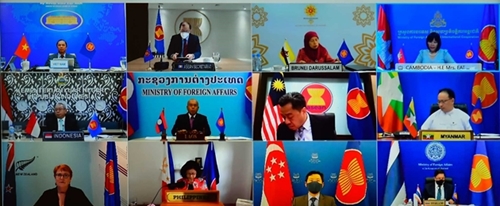In his remarks, Dung emphasised the significance of maritime cooperation to security and economic development in each country, as well as the daily lives of regional residents.
He suggested ASEAN and New Zealand step up their coordination within the frameworks of the East Asia Summit (EAS), the ASEAN Regional Forum (ARF), the ASEAN Defence Ministers’ Meeting Plus (ADMM+), and the Expanded ASEAN Maritime Forum (EAMF).
    |
 |
|
At the 28th ASEAN-New Zealand Dialogue (Photo: thanhtra.com.vn) |
The move aims to promote dialogue, cooperation, trust building, and respect for international law, including the 1982 United Nations Convention on the Law of the Sea (1982 UNCLOS), he explained.
Dung also called for support towards efforts in building and promoting codes of conduct such as the Declaration on the Conduct of Parties in the East Sea (DOC) and the Code of Conduct in the East Sea (COC).
The two sides should strengthen sustainable cooperation and join hands in consolidating and improving the operational efficiency of maritime cooperation mechanisms and frameworks in the region, he said.
The countries also need to enhance dialogue, collaboration, trust building and law respect, and ensure an environment of peace, security, and stability, in order to facilitate recovery and sustainable growth, Dung stressed.
Alison Mann, head of New Zealand’s ASEAN SOM, said New Zealand attaches importance to the relations with the ten-member grouping, and commits to further working as ASEAN’s active partner in frameworks, dialogues, and cooperation mechanisms led by ASEAN in the region.
The two sides agreed to closely coordinate in pushing ahead with the implementation of the Joint ASEAN-New Zealand Leaders’ Vision Statement approved last November so as to deepen their strategic partnership.
With the 2021-2025 action plan, the two sides will boost cooperation in such priority areas as economy, trade, investment, the fight against terrorism and transnational crime, education, environmental protection, climate change, natural disaster management, sub-regional development, and narrowing development gaps.
The countries consented to continue their close coordination in order to contribute to maintaining regional peace, security, and stability, including security and safety in the East Sea.
Source: VNA